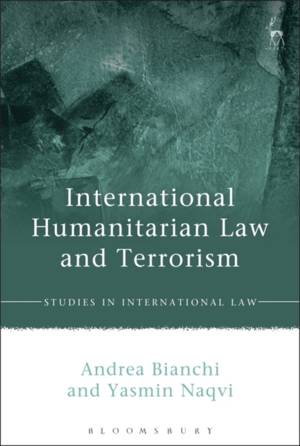
- Retrait gratuit dans votre magasin Club
- 7.000.000 titres dans notre catalogue
- Payer en toute sécurité
- Toujours un magasin près de chez vous
- Retrait gratuit dans votre magasin Club
- 7.000.0000 titres dans notre catalogue
- Payer en toute sécurité
- Toujours un magasin près de chez vous
Description
This book carefully and thoroughly analyses the legal questions raised by the phenomenon of terrorism, and past and recent efforts to fight it, from the perspective of international humanitarian law (IHL). The objective is to substantially contribute to a better understanding of the issues surrounding the content and applicability of IHL as it applies to terrorism as well as to analyse and contextualise the current debates on these controversial and critically important questions. While due heed is paid to doctrinal debates, particular emphasis is placed on the practice of social actors, particularly, although not exclusively, States. The analysis of their actual conduct as well as their expectations about the interpretation and application of the law is crucial to establishing an interpretive consensus on when and how IHL is relevant to regulate acts of terrorism.
The approach of the book is analytical and discursive, rather than prescriptive. Thus the reader will find the relevant rules of IHL and other legal regimes as regards terrorism, but also the debates over their application, the contradictions in State practice and the impact these may have upon IHL's evolution and implementation. The aim is to provide legal practitioners, as well as those in military, political and academic circles, with a useful reference point. Hopefully the book will also prove useful to other readers who will find its content and easy-to-read style an encouragement to getting acquainted with a topical subject, traditionally thought to be reserved for legal specialists. This book was cited with approval by the US Court of Appeals in Salim Ahmed Hamdan v United States of America, 16th October 2012Spécifications
Parties prenantes
- Auteur(s) :
- Editeur:
Contenu
- Nombre de pages :
- 407
- Langue:
- Anglais
- Collection :
- Tome:
- n° 34
Caractéristiques
- EAN:
- 9781849461375
- Date de parution :
- 01-07-11
- Format:
- Livre relié
- Format numérique:
- Genaaid
- Dimensions :
- 156 mm x 234 mm
- Poids :
- 793 g

Les avis
Nous publions uniquement les avis qui respectent les conditions requises. Consultez nos conditions pour les avis.






